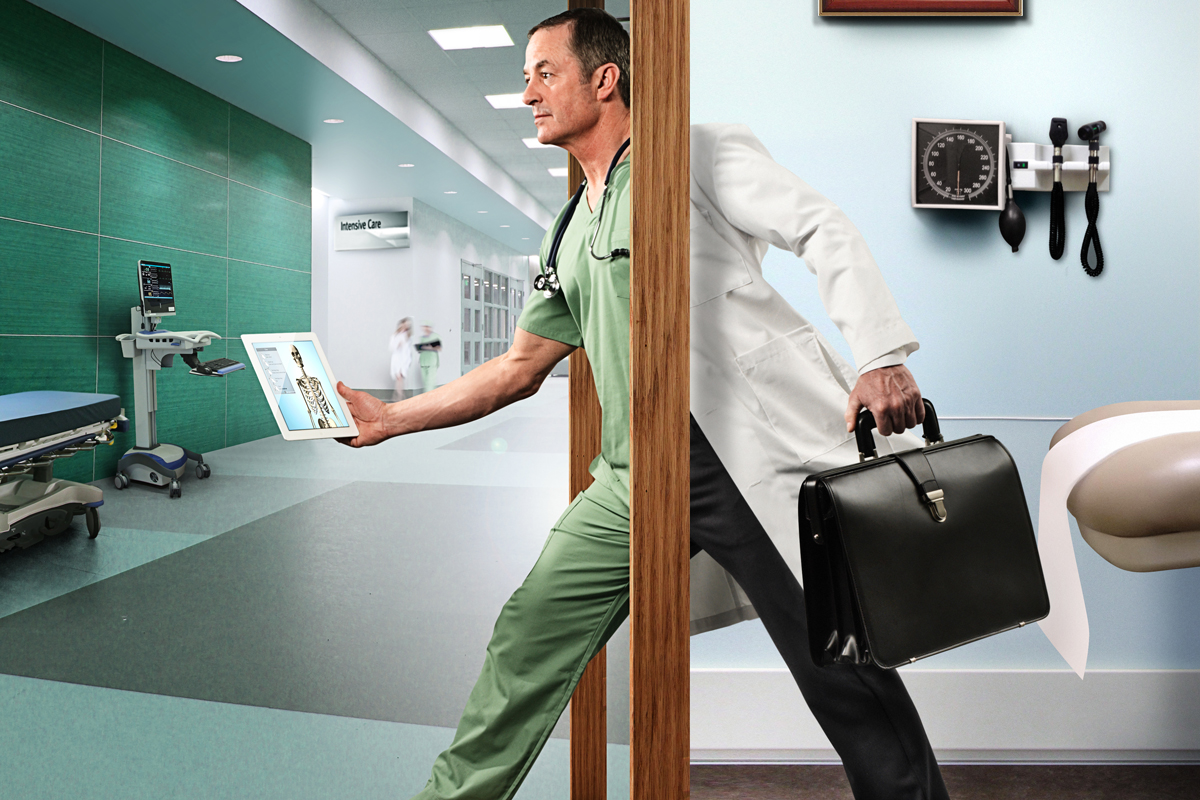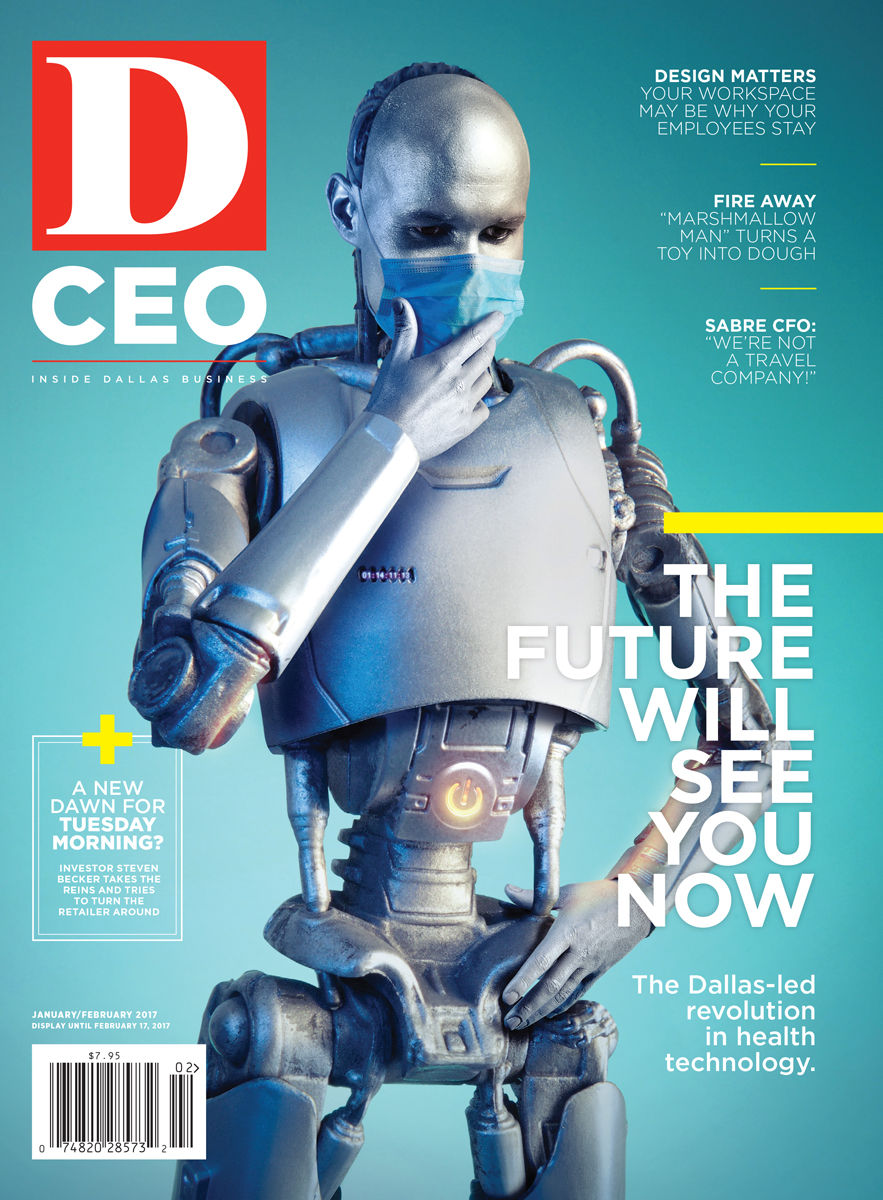A trip to the doctor can be a headache in itself. Too often, time is lost, procedures are slow, communications are spotty, and care instructions are administered with little to no follow-up, all because of the antiquated existing systems. But, what if new technology could change that experience?
What if hospitals prescribed pills equipped with ingestible digital sensors to track the effectiveness of the medicine? What if communications from healthcare providers were instantaneous, thanks to artificial intelligence? What if treatment and outcomes weren’t determined solely by doctors, but reinforced by predictive analytics drawing data from hundreds of sources? What if the waiting room was your living room, bedroom, or game room? What if you could order aid from a medical professional as easily as you can request an Uber car?
Welcome to the future.
These are just a few of the technologies that have been developed or adopted by Dallas-Fort Worth healthcare innovators.
 With the rising cost of care, the lower barrier of entry to create technology solutions, and the growing desire to make care more personal and convenient, DFW innovators are finding new ways to rise to the occasion—and they’re cashing in along the way.
With the rising cost of care, the lower barrier of entry to create technology solutions, and the growing desire to make care more personal and convenient, DFW innovators are finding new ways to rise to the occasion—and they’re cashing in along the way.
“It really is a hot bed,” Julie Hall-Barrow, vice president of virtual health and innovation at Children’s Health, says of North Texas. “We’re not rolling and bowling yet, but we have a lot of air bubbles coming to the top, and I think it’s going to continue to grow.”
Healthcare Systems
Dallas-Fort Worth is home to 10 active healthcare systems, all competing to provide the best quality of care, meet consumer expectations, and reduce operating costs. So systems including Baylor Scott & White Health and Children’s Health know if they’re going to be leading providers, they have to keep technology at the forefront of their operations.
“The government is pushing on new reimbursement models, and systems like ours are pushing on creating a better model. So there’s a huge transformation happening,” says Nick Reddy, chief digital officer at Dallas-based Baylor Scott & White Health.
Baylor Scott & White got a leg up on its innovation efforts in 2011, when the healthcare system hired Reddy as senior vice president of information technology. Reddy, a former consultant, led large investments and implemented technology. Four years later, Reddy was elevated to chief digital officer, as BSW CEO Joel Allison made technology an even higher priority.
Reddy works with a team of 15 people, along with insights from various members of the 37,000-person BSW workforce, to modernize the patient experience. Reddy and his group have already rolled out products like MyBSWHealth, an online portal and mobile application that allows patients to access their medical information, payments, and appointments from any device. The team also has begun pushing out remote monitoring solutions and virtual care on-demand. As this story went to press, the system was preparing to launch pilot programs, with help from two tech companies, to test how artificial intelligence could improve and speed up manual processes.
Dallas-based Children’s Health has ramped up its innovation efforts, too. In the past year, it’s created an investment arm, Children’s Ventures, and hired an expert in telehealth, Hall-Barrow, to lead new virtual health and innovation initiatives. So far, the provider has partnered with four companies—including two in Dallas. It also has introduced telehealth programs at more than 100 schools in North Texas, created the technology-driven brand Family Health with help from Dallas startup Mend, begun offering sensor-equipped pills, and adopted a data analytics platform from Pieces Technology of Dallas.
Hall-Barrow says Children’s now is slowing the pace of its investment to focus on the return-on-investment of its current portfolio of companies. “Are we truly driving down ER costs because children can see doctors in school? Absolutely,” Hall-Barrow says about the telehealth initiative. “We think there’s significant reason why kids are still in school. We’re starting to see that data now, that ROI.”
The Corporation
If there’s money to be made in a somewhat technologically antiquated industry, there are likely to be corporations capitalizing on the opportunity. And in DFW, home to 21 Fortune 500 companies, that’s exactly what’s happening.
One of the latest success stories for the region is Anthelio Health, an Irving-based company founded in 1999 that recently sold for $275 million to French digital services company Atos, which operates its North American headquarters out of New York. Anthelio helps healthcare systems and hospitals digitize and track patient care from registration to scheduling and payments. It also offers IT outsourcing services. The company, led by CEO Asif Ahmad, who has more than 20 years of experience in healthcare technology, generates $200 million in annual revenue and employs 1,700 people worldwide—100 of them in DFW.
In 2015, Atos bought Xerox ITO, the information technology outsourcing business of Xerox that had a heavy presence in Dallas, for $1.05 billion. This acquisition made the U.S. Atos’ largest market, but it wasn’t done buying yet. “Because of what’s happening in healthcare, we were very attractive,” Ahmad says of Anthelio. “Healthcare has become a technology business.”
In January, the combined company is expected to introduce a unified brand operating out of a consolidated, 100,000-square-foot space in Irving. The new office will serve as the global company’s healthcare hub, with Ahmad leading the North American healthcare division.
Frisco-based Conifer Health Solutions, on the other hand, found a successful business path by developing within a healthcare system. Conifer, which is 76.2 percent owned by Tenet Healthcare, began in the basement of Tenet in 2008. Stephen Mooney, who would later become Conifer’s CEO, originally was charged with patient financial services in Southern California. But when the company began to grow, a clear problem emerged within its financial reporting operations. “They were doing this work in the four walls of the hospital—out of the basement,” Mooney says. “They had so many systems … the data integrity was becoming a challenge.” And getting a clean financial report to their chief financial officer, he adds, was a difficult task.
So the business shifted from each division running independent operations to centralized centers. Mooney was asked to create a financial service solution Tenet could use system-wide. In January 2004, he moved to Dallas to open the first of 20 centralized centers.
Mooney and his team started testing the market: Would other healthcare providers use a technology solution from a competitor if it offered a significant ROI? The answer: Absolutely.
Then Mooney launched Conifer in November 2008. The company helps healthcare providers streamline patient and financial data, allowing patients to fill out paperwork, get insurance information validated, and understand cost before stepping foot inside a medical center. Wait time is significantly reduced, as is the work for medical assistants and for reporting purposes. The company started with 2,000 employees and generated $200 million in revenue in its first year. Eight years later, it has more than 15,000 team members across 43 states. Last year, it generated $1.5 billion in revenue from more than 800 clients.
Even insurance providers are jumping into the tech game. In November, Blue Cross Blue Shield of Texas announced plans to open an innovation unit in the West End, a rising innovation community.
The Startup
Erick Rock’s entrepreneurial journey started with two successful startups—restaurant table management and reservation software company ProHost, which sold to San Francisco-based OpenTable in 2001 for an undisclosed amount, and healthcare software provider MEDHOST, which continues to serve more than 600 hospitals today. “An emergency doctor saw what we were doing with restaurants, and wanted to do the same thing for emergency rooms,” Rock says about the creation of MEDHOST, which built touchscreen management software for the ER. “I said, ‘Let’s do this,’ but knew nothing about healthcare.”
 Now, Rock is leading a team of 50 employees at his Plano-based digital health software company, Vivify Health, which includes leaders from MEDHOST. Vivify, founded in November 2009, serves more than 700 hospitals with its digital platform that includes features like virtual visits, biometric data collection, and the digital delivery of prescription care plans. The company, which has raised $30 million from investors, has landed health systems like Texas Health Resources and CHRISTUS Health as clients. In 2016, the startup tripled its revenue and was expecting to hit the $10 million mark by year’s end. “Healthcare is being flipped upside down,” Rock says. He believes Texas companies, unlike those on the West Coast, are judged by their profitability and revenue stream and, as a result, often aren’t looking for an exit: “DFW is in a very good position for stable, long-term companies.”
Now, Rock is leading a team of 50 employees at his Plano-based digital health software company, Vivify Health, which includes leaders from MEDHOST. Vivify, founded in November 2009, serves more than 700 hospitals with its digital platform that includes features like virtual visits, biometric data collection, and the digital delivery of prescription care plans. The company, which has raised $30 million from investors, has landed health systems like Texas Health Resources and CHRISTUS Health as clients. In 2016, the startup tripled its revenue and was expecting to hit the $10 million mark by year’s end. “Healthcare is being flipped upside down,” Rock says. He believes Texas companies, unlike those on the West Coast, are judged by their profitability and revenue stream and, as a result, often aren’t looking for an exit: “DFW is in a very good position for stable, long-term companies.”
Like Rock, entrepreneur Chris Heckler is finding rapid growth in digital services in medicine. Heckler is the founder and CEO of Valify, which operates out of the North Texas Enterprise Center, a Frisco business accelerator. He started Valify in March 2014 to organize hospital accounting processes and to allow providers to see the total spend across vendors and categories. “It sounds crazy, but they have zero visibility into spend right now,” says Heckler, who used to handle vendor expenses for the Texas Purchasing Coalition, an organization that represents 10 healthcare systems. “We only had access to their data via Excel. It would take five or six months to get all this data cleaned up.”
Heckler now employs 21 people and has contracts with 473 hospitals. He declined to disclose revenue, but projects Valify will double or triple its multimillion-dollar revenue in 2017.
Beyond cutting costs, providers also want to improve their relationship with patients. So startups that offer personalized care solutions also are finding traction in DFW. Dallas-based startup Mend partnered with Children’s Health in 2015, and since has helped the system roll out Family Health On Call, offering patients on-demand home care. Similarly, on-demand healthcare startup PediaQ of Dallas has partnered with Baylor Scott & White and Memorial Hermann in Houston.
The Investor
One of the most active early-stage investment groups in healthcare startups is Green Park & Golf Ventures. The Dallas family office opened in 2011 and since has partnered with independent angels to invest $30 million in early-stage startups, many of them in healthcare technology.
Founders Carl Soderstrom and Clay Heighten began the firm after selling their Dallas company MedicalEdge Healthcare Group to Texas Health Resources in 2011 for an undisclosed price. The company employed more than 400 physicians, physician assistants, and nurse practitioners. The sale left the two founders with a pot of cash that they wanted to reinvest into the community. So they founded Green Park & Golf, named after the streets Soderstrom and Heighten lived on. They added JR Garcia to their team to help them understand early-stage investments. “The other thing that happened that was unexpected was a number of physicians made some money from the sale and wanted to know if they could pile on to our investments,” Soderstrom says. “So without intention, a little angel investment group came together.”
GPG has made 53 investments ranging from $500,000 to $1.5 million. Sixteen of the investments were healthcare technology startups from Texas. Nine of those are based in DFW. “What I see coming out of here is tech-enabled services around healthcare,” Garcia says. “It’s more broad technology applied to healthcare.”
In the first three quarters of 2016, venture capital and angel investments in DFW healthcare technology companies totaled $29 million, the most in the past 10 years, according to PitchBook. This is up from $9 million in 2015 and $24 million in 2014.
Though GPG has seen a rising interest in healthcare and healthcare technology investments in the market, it believes there’s still a shortfall of local investment sources. “There’s plenty of money in Dallas, but people largely make investments in oil and gas and real estate,” Soderstrom says. “While they’re interested in healthcare investments, they don’t feel like they know enough.
“If Dallas is going to be known as the place for healthcare tech, there’d need to be 20 of us and dozens and dozens of companies,” Soderstrom says, adding that billion-dollar funds in the Bay Area allow investors to make hundreds of small bets. “That doesn’t exist here. So we really have to be picky with the level of success and traction that these companies are getting.”
The Advocate
Thanks to startup advocates like the Health Wildcatters accelerator and research institutions like UT Southwestern, entrepreneurs can get on the fast track to profitable ventures.
Health Wildcatters, ranked as the top healthcare accelerator in the Southwest, according to the Seed Accelerator Rankings Project, wrapped up its fourth class of entrepreneurs in November, bringing its total number of graduates to 42. The accelerator, led by Huber Zajicek, invests $30,000 for an 8 percent equity stake in startups that enter its 12-week program. So far, the program has attracted 150 mentors and 90 investors. Graduates, not counting the latest class of 10 companies, have raised more than $16 million. “As the ecosystem goes, there wasn’t a really good place for startups to go to except NTEC,” says Zajicek, who served as the managing director of NTEC from 2011-2013. “Now, you have a very clear delineated place.”
Zajicek recently took Health Wildcatters a step further—moving it into a 16,620-square-foot space that houses the accelerator’s companies, graduates, partners, and investors. The accelerator also launched the Health Investor Alliance, which comprises 26 venture capital firms committed to reviewing Wildcatters’ companies for investment.
“Healthcare is strong here–stronger than in any other Texas cities,” Zajicek says. “We’re still early, and there are still a lot of problems to be solved. But there’s no reason Dallas isn’t among the top five or 10 healthcare IT cities in the country.”
DFW also has a small treasure chest of resources that aid in the development of healthcare technology. UT Southwestern, for example, is a research mill, publishing findings from some of the world’s leading physicians and scientists. The university boasts six Nobel laureates, 22 National Academy of Sciences members, and 18 National Academy of Medicine members.
It also has launched a new effort to connect its research to entrepreneurs who can commercialize solutions based on scientific findings. “We have a lot of great scientists that continue to produce cutting-edge technology,” says Kevin Hunt, a director at UT Southwestern Medical Center’s Office for Technology Development. The new venture is set up based on a revenue-share model, which gives the original scientists and researchers a cut of the money. UT Southwestern was expected to spin off its first company in January.
While it’s too soon to know whether DFW will emerge as a health tech leader, Baylor Scott & White’s Reddy likely sums up local sentiment. “Don’t underestimate the markets here,” he says.






